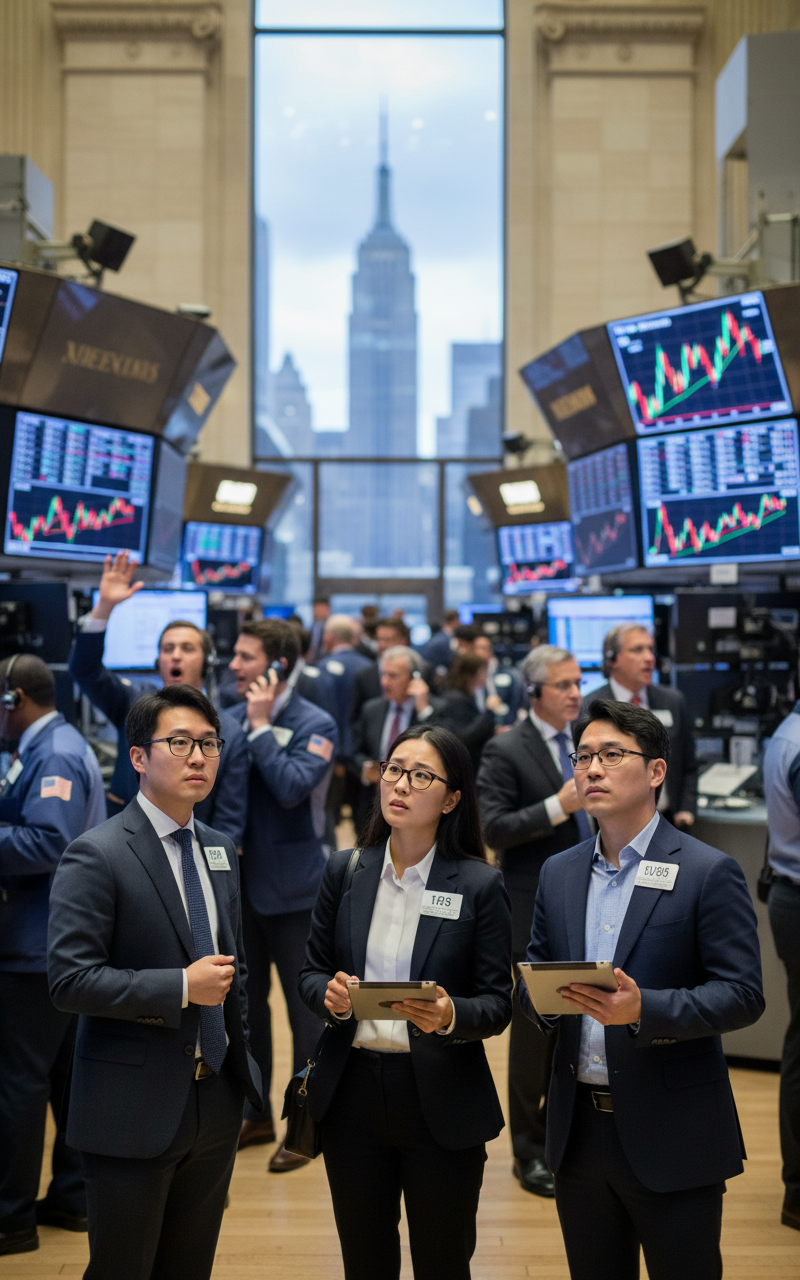Wall Street Starts Mixed Amid Powell's Comments, Tech Stock Volatility

Wall Street Starts Mixed Amid Powell's Comments, Tech Stock Volatility
New York, October 30, 2025 (local time) – Wall Street commenced trading on a mixed note as investors grappled with remarks from Federal Reserve Chair Jerome Powell and a split performance among technology stocks. Investor caution prevailed as Powell's hawkish tone heightened uncertainty regarding a potential interest rate cut in December. Notably, increased stock price volatility following tech companies' earnings releases contributed to a wait-and-see attitude across the market. Weakness in major European markets further dampened investor sentiment. Amidst this backdrop, the Dow Jones Industrial Average showed a slight gain, while the S&P 500 and Nasdaq Composite indices both declined. Market analysts suggest that while Powell's comments may negatively impact the market in the short term, long-term responses will be flexible and dependent on evolving economic conditions. Furthermore, with the conclusion of tech earnings announcements, the market is expected to refocus on macroeconomic indicators and interest rate hike forecasts.
The Dow Jones Industrial Average opened higher, starting trading at 47,838.52, up 0.43% from the previous day. This is attributed to the relatively stable performance of stocks in traditional industrial sectors. Conversely, the S&P 500 opened down, recording 6,867.20, a 0.34% decrease. The S&P 500, reflecting the broader market trend across various sectors, was impacted by the underperformance of tech stocks. The Nasdaq Composite, a tech-heavy index, fell further, recording 23,779.42, a 0.78% drop, exceeding the S&P 500's decline. This decline is largely attributed to the impact of falling stock prices of major tech companies like Meta Platforms and Microsoft. In particular, Fed Chair Jerome Powell's comments appeared to further dampen investor sentiment, exacerbating the tech stock downturn.
Major tech company stock performance was mixed. Despite exceeding expectations with its earnings, Meta Platforms plunged nearly 12% due to uncertainties surrounding its future outlook. This suggests investors are questioning Meta Platforms' future growth potential. Microsoft also reported strong earnings, but experienced a drop of around 2%, falling short of expectations. This is likely due to analysts suggesting that Microsoft's stock price has already reached a high level, limiting potential for further gains. Conversely, Alphabet rose more than 5%, demonstrating strong growth among tech stocks. This is attributed to the continued growth of Alphabet's cloud computing division and positive results in the field of artificial intelligence. With tech stocks showing such divergent performance, the market as a whole experienced increased volatility.
European markets continued their downward trend. The Euro Stoxx 50 index recorded 5,685.89, down 0.35%. While the German DAX rose slightly by 0.08%, the French CAC 40 and the UK FTSE 100 fell by 0.27% and 0.34% respectively, indicating a general downward trend across major European markets. This is attributed to concerns about slowing European economic growth and the prospect of further rate hikes from the US Federal Reserve (Fed), dampening investor sentiment. In particular, the European Central Bank (ECB) has also hinted at the possibility of interest rate hikes, putting pressure on European stock markets. In addition, geopolitical risks continue to negatively affect European stock markets, with the prolonged Russia-Ukraine war and instability in the Middle East further undermining investor confidence. With these factors combined, European stock markets are expected to continue their downward trend for the time being.
Meanwhile, December West Texas Intermediate (WTI) crude oil fell 0.84% to $59.97 per barrel. This is attributed to concerns about a global economic slowdown and growing fears of oversupply as U.S. oil production increases. In addition, the failure of OPEC and its allies (OPEC+) to announce further production cuts has further fueled the decline in oil prices. However, given the continued geopolitical risks in the Middle East, the fall in oil prices is expected to be limited. Market experts predict that while oil prices may continue to decline in the short term, volatility could increase in the long term depending on supply and demand conditions and geopolitical risks. Investors need to be careful about the volatility of the oil market and make investment decisions cautiously.
